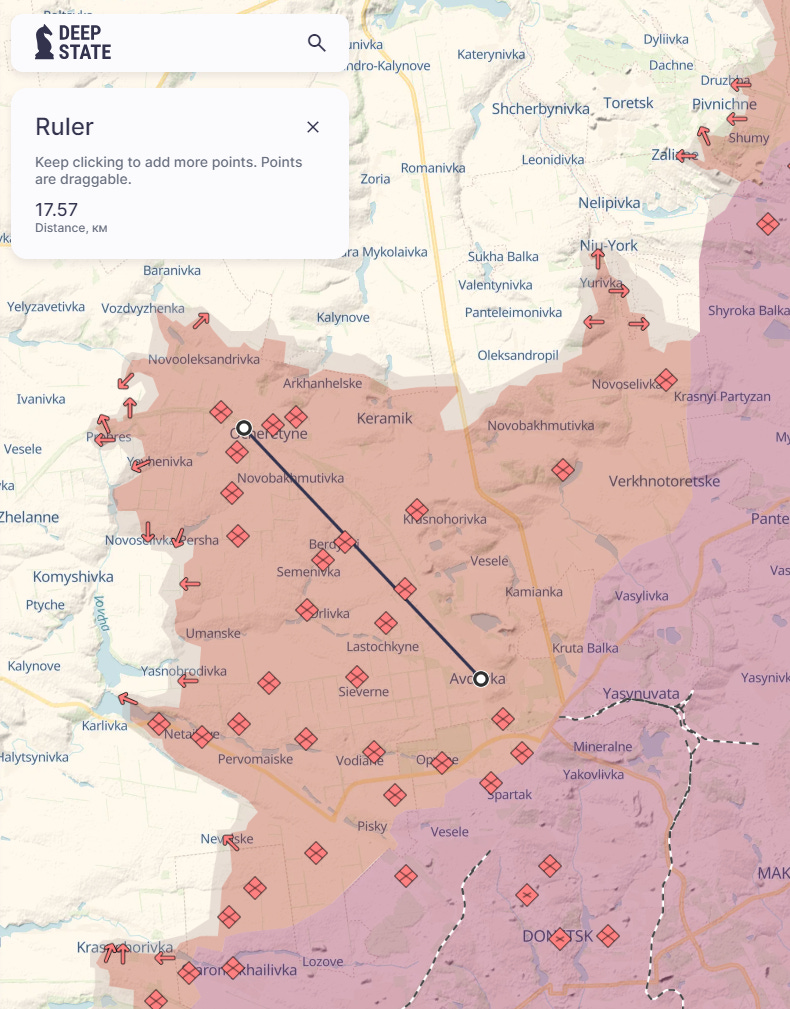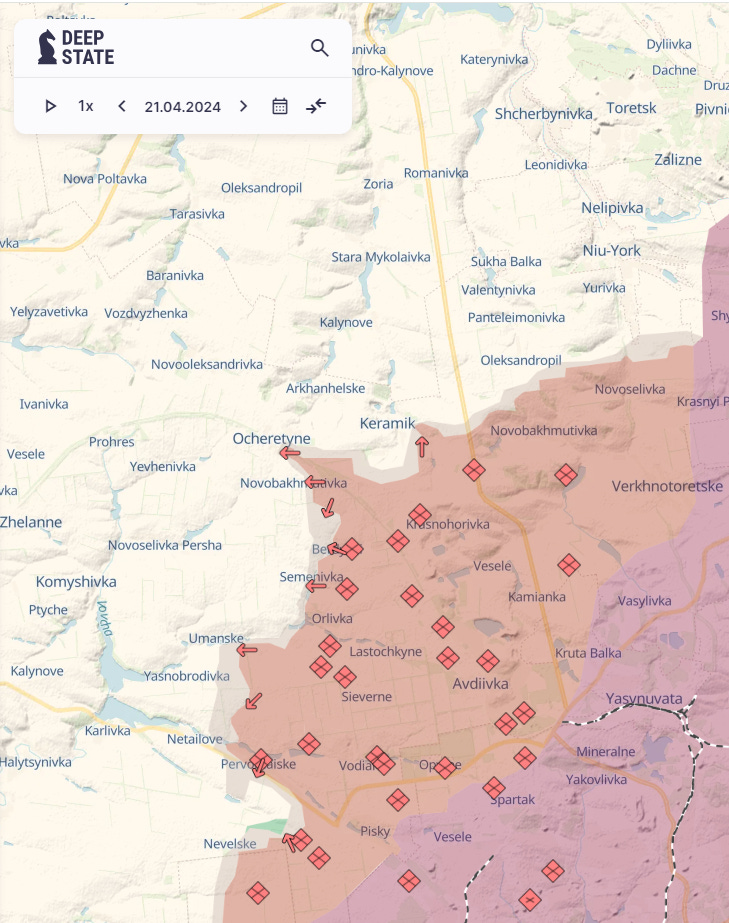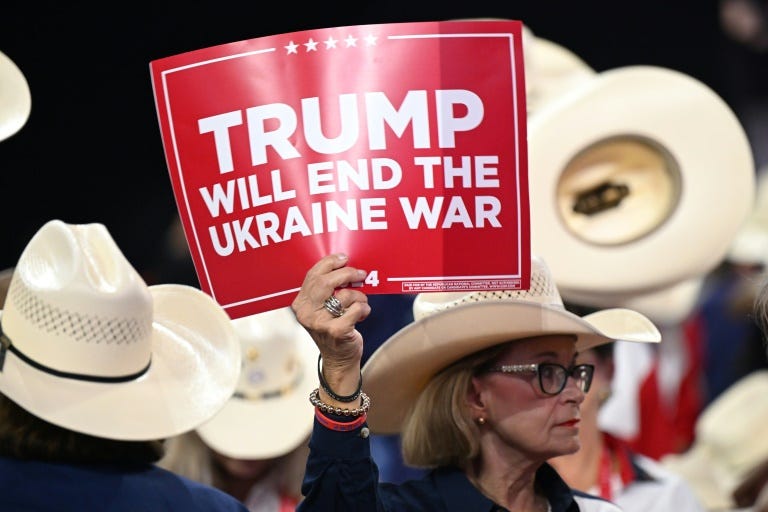Russia does not have the ability to conduct combined-arms warfare. Its soldiers lack the training and equipment to break-through and exploit any opening. Ukrainian defenses are getting better and as more aid reaches Ukraine, Russian advances are getting more difficult. Knowing that they cant conduct modern war, Russia is trying to take whatever they can, no matter how small and how much it costs, on the assumption Trump wins, and they get to keep it. The Ukrainians' strategy is to inflict so many losses that the Russian army become even more combat ineffective in 2025 because of the damage. (Then) build up Ukrainian forces, and return to the offensive on 2025 when you have a qualitative advantage and the Russians are degrading in quality.We are now almost 7 months through 2024 (almost 30 months since the full-scale invasion was launched by Putin) and the contours of what both Russia and Ukraine are trying to do are becoming clearer. Indeed, what we have seen on the battlefield, particularly now in the Donbas, reinforces the view that both have distinct strategies at present. To make it more comprehensible, I will divide up the Russian and Ukrainian strategies into what we are seeing in the moment and what we can expect in the longer term.
Immediate Russian Strategy
It should now be apparent to all, including those who lost their heads in May about the Russian Kharkiv Offensive, that Russia does not have the ability to conduct combined-arms warfare. Its soldiers lack the training and equipment to break-through Ukrainian lines and exploit any opening for major advances. Moreover, Ukrainian defenses are getting better and as more aid reaches Ukraine, Russian advances are getting more difficult.
Moreover, with US aid reaching Ukraine now, and indeed some more European or European-secured aid also appearing, Russian advances are getting probably more difficult.
So, if they cant execute the kind of warfare that many assumed they were built to do, what are the Russians doing? Well, what they seem to be doing is pretty straightforward—they are trying to take as much of the Donbas as possible this year, particularly aiming to do so until the US Presidential election in November, or actually inauguration in January 2025.
With these dates in mind, they have given up even thinking about combined arms warfare. Instead, they are making constant, high-loss assaults regularly up and down the line, to take little bits of territory here and little bits of territory there. It literally is a farm field here, a shack there. Their single most successful area has been around the Ocheretyne bulge—where they have made incremental progress at extreme cost.
Here is the Ocheretyne Bulge today: Ive put a marker from Avdiivka to Ocheretyne so you can get some idea of the distances involved—its 17.57 kilometres (which is 10.9 miles)
To give you an idea of how long its taken to carve out this bulge (which is of actually a very small area) Russian forces first reached Ocheretyne exactly 3 months ago). Here is the map of the same area on April 21.
So in 3 months the Russians have pushed out of Ocheretyne by about 5-7 kilometres in all directions (3-5 miles). Its why I have labelled these micro-advances.
In some ways its a realization of the very limited capabilities of the Russian military. Knowing that they cant conduct modern war, they are trying to seize as much Ukrainian territory as possible (even tiny slivers) before the US election on the hope that Trump gets elected (not a bad hope based on the present polls).
Longer-Term Russian Strategy
At that point, Russian strategy seems based on having Trump threaten Ukraine with no more aid unless a cease-fire is forced and the battle line frozen at that time (in other words, Russia in possession of all the territory it takes with the micro advances ). Then some kind of negotiations will take place—which is exactly the time Putin needs to actually do what he cant do now—accumulate a new strategic reserve. Indeed, with Trump as president, Putin will have 4 years to basically plan any resumption of hostilities on exactly his own terms.
Its not a terrible strategy if you have no worries about inflicting horrific losses on your own population and you have confidence that Trump will do exactly what you want (and you have confidence that if Trump does exactly what you want—then Europe will have to go along. This is the fly in the ointment that I will discuss at another time).
So in a nutshell, Russian strategy is take whatever you can now, no matter how small an area and no matter how much it costs, on the assumption Trump wins, and you get to keep it. You then have four years to basically recover and come again when you are ready. The strategy is based around the longer term degradation of Ukraine as a power, the friendship of Trump, and the weakness of Europe. I should also add that even though I am using the word Russian—the strategy seems very much to be Putin’s own. No Russian who actually cared about his or her own people would follow such a strategy that inflicts so much loss on their own people. But strategy is often not rational and not in a nation’s national interest. It reflects the personal and political needs of the leadership.
Immediate Ukrainian Strategy
The Ukrainians have learned a hard lesson over the last year. The first was the difficulty of advancing into the face of defensive firepower, and the second was the unreliability of the USA as a partner. They have also struggled generating new soldiers.
What they have started to do, quite obviously, is fight a war that is now based on the Russians continuing with their micro-advance strategy. What you have not seen this year, and are unlikely to see, is any attempt at a wide-scale Ukrainian offensive. They will do some limited counterattacks in their idea of active defense—however that will be all. Mykola and I have talked a great deal about this active defense strategy—starting last Autumn.
For the rest of the year, the Ukrainians seem to be intent on increasing the loss rate of Russian forces while reducing their own. This is contributing to what we are seeing now. The Russians make their micro-advances, the Ukrainians seem to be trying to use them to inflict high losses—rinse and repeat.
In many ways the strategy the Ukrainians are following seems based around inflicting so many losses that the Russian army become even more combat ineffective in 2025 because of the damage it has received.
There has, helpfully, been a more sober assessment of the Russian equipment and manpower situation in the last few weeks. A few months ago people were speaking of Russia being some immense military machine that can generate massive military force. It cant. It is now generating about as many soldiers per month as it is losing (say 30,000 at most). That of course is a recipe for longer term stagnation or even degradation of forces. It means that they need to get soldiers to the front very quickly, with rudimentary training. Its not clear for morale or military learning and it means that building up a large scale strategic reserve is practically impossible.
(Its also another reason the Russians are banking on a Trump victory—they can then start accumulating the strategic reserve that they cant build up at present).
It is also a recipe for demographic disaster which could start having real political impact. Russian strategy is basically destroying its future, as Francis Dearnley (worth a read) wrote in this piece. Ukrainian strategy in one way is to accelerate that process.
The same comes to what is happening with Russian equipment losses. Again, a greater understanding is appearing of limitations in Russian generation of new equipment. A great deal of what the Russian army is fielding when it comes to heavy equipment is still Soviet era materiel being taken out of storage. There stockpiles are large, but are beginning to thin out. The Economist put together this story on the situation.
This is a significant problem for the Russians. Even if stocks exist, the more they run them down, the more they have to rely on the older, the less good, and the less well-maintained. So even if by running down Soviet era stocks, the Russians can maintain the same number of tanks or artillery tubes (for instance) they will gradually be less good tanks and less effective artillery pieces.
btw, if you want to follow a good source tracking Russian losses, which breaks them down by type, and shows how in many classes better equipment is being replaced by less good—take a look at Richard Vereker on twitter. Vereker did an interesting evaluation of the Economist piece (which talked about his work).
So to summarize, Ukrainian strategy at present has settled into a pattern of trying to maximize Russian losses, to lead to a steady degradation of Russian fighting capabilities for 2025.
Longer-Term Ukrainian Strategy
The great challenge the Ukrainians face is what happens in 2025 even if they can degrade Russian equipment and manpower to a significant degree. The Ukrainians will still be faced with the difficulty of attacking and they might even have to face Donald Trump in the White House. Both of these are extremely challenging—to say the least.
Note—this was not a challenge that Ukraine had to face, if only Ukraine’s supporters had chosen to arm Ukraine properly to win the war. However that now looks increasingly less likely. So far the Biden administration is still doing their arm not to lose policy—and time is running out as I said in the Atlantic.
It seems that the Ukrainian strategy for 2025 is therefore somewhat fungible. If a Democrat wins and they can degrade Russian forces like they have been, then they can consider some offensive operations. By this point both US and European production—to say nothing of Ukraine’s own production capabilities—will be rising. This should provide Ukraine more and better equipment than the Russians, who will still be taking older Soviet stuff out of storage.
Of course to have a chance of success, the Ukrainian strategy will still need to see the Ukrainians generate and train a large number of new forces (there are finally some hopeful signs on this) and build up mass on their own ranged systems (UAVs, missiles, etc). So the hopeful strategy is inflict huge losses now, build up Ukrainian forces, and return to the offensive on 2025 when you have a qualitative advantage in the material that matters and the Russians are degrading in quality.
This brings up the question of what longer-term Ukrainian strategy is if Trump wins. So much of that then depends on what Europe decides to do. Europe still has the resources to see Ukraine through to victory (It would take both political will and economic mobilization—and we have not seen enough of that to this point)—but it would change and lengthen the war. I can’t really go into it in enough detail here—but I am writing a piece (with a brilliant co-author) which I hope to have out in a major publication on this soon.
Trump's Acceptance Speech and the War
You might have missed it, but Donald Trump formally received the Republican nomination for president this week. In his long and disjointed acceptance speech he actually referred to Ukraine alot—without specifically mentioning the country much. Basically he reinforced the notion that if he wins, Ukraine is given an ultimatum (ceasefire on present lines or all aid cut off).
Here is a transcript of the address.
In it Trump claims he will end the war (no details) and indeed every other crisis in the world by being wonderful. I weep at the gullibility of the people who take such statements seriously.
I will end every single international crisis that the current administration has created, including the horrible war with Russia and Ukraine, which would have never happened if I was president.
Well if there were few specifics—how can we say its likely that Trump will basically try to dictate a bad peace to Ukraine? Well, its because of what he was specific about—he loves dictators and authoritarians, and in particular Viktor Orban who has basically been pushing Putin’s plans.
In this rambling, extraordinarily egocentric passage, Orban is wonderful because he recognizes that Trump is amazing, and Orban understands what needs to be done for peace which is to defer to Trump.
I was the first president in modern times to start no new wars. You know, we were the toughest. We were the most respected. And you saw this. Hungary, strong country. Run by a very powerful, tough leader. He’s a tough guy. The press doesn’t like him because he’s tough. And he came out recently. They were asking him at an interview: The whole world is exploding, what’s happening, what’s going on. Viktor Orban, prime minister of Hungary, very tough man. He said, “I don’t want people coming into my country and blowing up our shopping centers and killing people.”
But they said to him, “Tell us, what’s going wrong? What’s happening? What is it?”
He said, “There’s only one way you’re going to solve it. You got to bring President Trump back to the United States because he kept everybody at bay.”
True. He used a word I wouldn’t use because I can’t use that word. Because you’d say it was braggadocious. The press would say, “He was a braggart.” I am not a braggart.
But Viktor Orban said it. He said “Russia was afraid of him. China was afraid of him. Everybody was afraid of him. Nothing was going to happen.”
Btw, other dictators get praise. Kim Jung-Un is also a good man to Trump it seems—at least partly because Kim really misses Trump.
I got along very well, North Korea, Kim Jung Un. I got along very well with him. The press hated when I said that.
“How could you get along with him?”
Well, you know, it’s nice to get along with someone who has a lot of nuclear weapons or otherwise. See, in the old days, you’d say that’s a wonderful thing. Now they say, “How can you possibly do that?”
But no, I got along with him and we stopped the missile launches from North Korea. Now, North Korea is acting up again. But when we get back, I get along with him. He’d like to see me back too. I think he misses me, if you want to know the truth.
So Trump loves Orban’s peace plans and loves Kim—that is clear. What there was not at all in the talk was any equivalent praise for the Ukrainians, Europeans or even NATO. There was not a single mention of NATO in the entire address—the longest US acceptance speech in history. Basically Trump either doesn’t care about or actively despises those countries who have been long-standing allies and partners of the US.
The amazing thing about Trump is that he screams out exactly what he is. He loves dictators and authoritarians and could not care less about NATO and probably Ukrainians. His choice of JD Vance further highlights both of these tendencies.
Anyone planning a Ukrainian strategy (or European for that matter) based on Trump doing anything positive for Ukraine, is dreaming. All strategies need to be based on the opposite.























0 comments:
Post a Comment